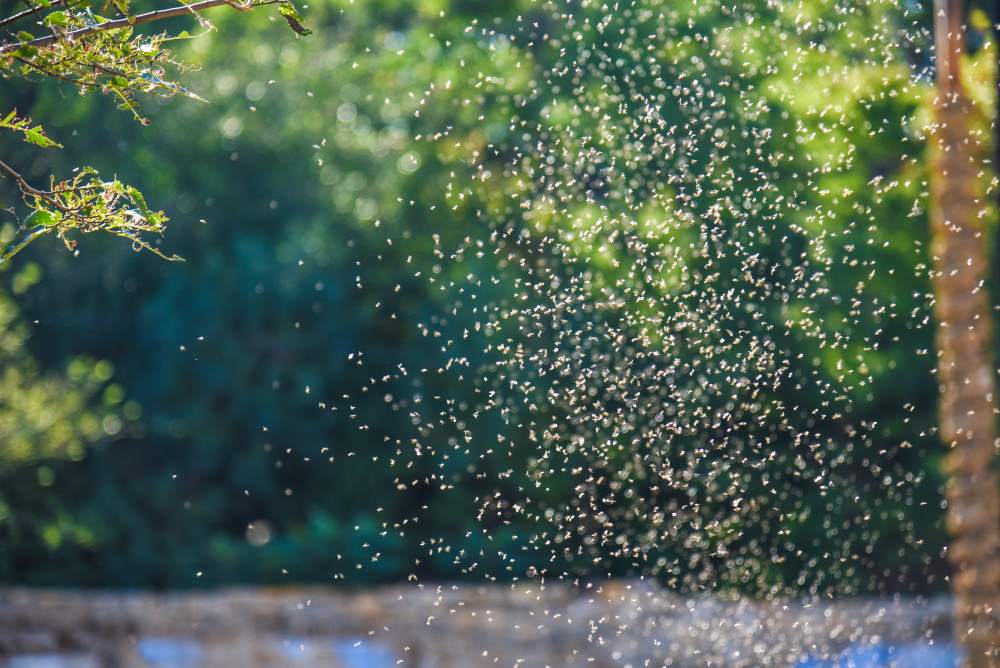
It’s summer in Charleston, SC again, which means the humid air is filled with a familiar buzz. Knowing how to prepare for mosquito season and how to protect yourself is essential for enjoying the summer months in the south without getting bitten. So put on your bug spray, we’re heading into the swarm of mosquito facts!
The Mosquito Life Cycle
Before diving into the details of the mosquito season in South Carolina, it’s crucial for you to understand the mosquito life cycle. These pesky creatures go through four stages: egg, larva, pupa, and adult. Each stage presents a unique opportunity for intervention and control.
Mosquitoes lay their eggs in stagnant water, where they hatch into larvae. The larval stage lasts about a week, during which these tiny creatures feed on organic matter in the water and grow rapidly. They then enter the pupal stage, a transitional period where they do not eat but undergo significant transformations.
Finally, the adult mosquito emerges from the pupal case. Female mosquitoes seek a blood meal to nourish their eggs, while males feed on nectar and plant juices.
Peak Mosquito Season in South Carolina
The peak mosquito season in South Carolina typically runs from April through October, although it can extend into early November in warmer years. This period corresponds with the state’s warmest and wettest months, providing ideal conditions for mosquito breeding and activity.
During this time, you’re likely to encounter mosquitoes in your backyard, parks, and other outdoor spaces. It’s important to note that mosquitoes are most active during dawn and dusk. This doesn’t mean you won’t encounter them at other times, but these are their peak activity hours.
Understanding when the mosquito season peaks can help you better prepare and take proactive steps to protect yourself and your loved ones. It’s not just about avoiding the annoying buzz and itch; it’s also about protecting your health.
Health Risks Associated with Mosquito Season
Mosquito season in South Carolina is not just a nuisance; it’s a public health concern. Mosquitoes are carriers of numerous diseases, including West Nile virus, Eastern Equine Encephalitis, and Zika virus. While these diseases are relatively rare, their consequences can be severe.
The West Nile virus, for example, can cause severe neurological illness, while Zika virus is known to cause birth defects. Eastern Equine Encephalitis is rare but extremely dangerous, with a 30% mortality rate. Health authorities in South Carolina monitor mosquito populations closely to detect any disease outbreaks.
Taking precautions during mosquito season in South Carolina is not just about comfort; it’s about safeguarding your health and the health of your loved ones. This is why it’s essential to take the mosquito season seriously and adopt preventive measures.
The Impact of Weather on Mosquito Season
Weather plays a decisive role in the mosquito season. Mosquitoes thrive in warm, humid conditions, which are prevalent in South Carolina for a significant part of the year. During the hot summer months, mosquito populations explode, transforming your peaceful backyard into a buzzing nightmare.
Rain is another critical factor contributing to the mosquito problem. Mosquitoes lay their eggs in stagnant water, so frequent rainfall creates ideal breeding grounds for these pests. South Carolina’s wet climate, coupled with its high humidity and warm temperatures, makes it a mosquito hotspot.
However, during the colder months, mosquito activity decreases significantly. Mosquitoes either die off or go into hibernation, providing residents some relief. But as soon as the weather warms up, they return in full force. It’s crucial to prepare for the mosquito season in South Carolina ahead of time to minimize their impact on your life.
Practical Tips to Survive Mosquito Season in South Carolina
Surviving mosquito season in South Carolina requires a multi-pronged approach. First, reduce mosquito breeding sites around your home. This means eliminating any standing water where mosquitoes can lay their eggs. Regularly clean gutters, empty bird baths, and cover rain barrels to prevent mosquito breeding.
Next, protect yourself from mosquito bites. Wear light-colored, long-sleeved clothing when outdoors, especially during dawn and dusk when mosquitoes are most active. Use a mosquito repellent containing DEET or Picaridin for added protection.
Finally, consider professional mosquito control services. These services can help reduce the mosquito population around your home, providing you with peace of mind and a mosquito-free living space.
Professional Mosquito Control Services in South Carolina
Professional mosquito control services can be a game-changer during the mosquito season in South Carolina. These services use scientifically-backed techniques to reduce mosquito populations safely and effectively. This includes targeting mosquito breeding sites and adult mosquitoes.
Precision Pest Control and Home Services can help you keep your home mosquito-free from March to November. With their help, you can enjoy your outdoor spaces without the constant buzz and bite of mosquitoes.
Professional mosquito control services are a worthwhile investment, providing you with peace of mind and protecting your health during mosquito season. Don’t let mosquitoes ruin your summer; contact Precision Pest Control and Home Services today.
The post Surviving the Buzz: A Guide to Mosquito Season in South Carolina appeared first on Precision Pest & Home Services | Pest Control Experts in Greater Charleston, SC.

